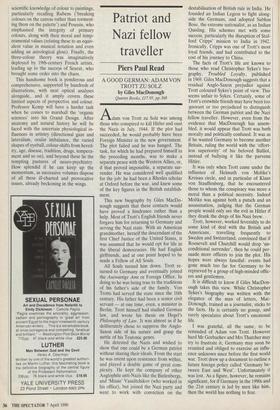Patriot and Nazi fellow traveller
Piers Paul Read
A GOOD GERMAN: ADAM VON TROTT ZU SOLZ by Giles MacDonough
Quartet Books, £17.95, pp.368
Adam von Trott zu Solz was among those who conspired to kill Hitler and oust the Nazis in July, 1944. If the plot had succeeded, he would probably have been Foreign Minister in the new government. The plot failed and he was hanged. The task, for which he had prepared himself in the preceding months, was to make a separate peace with the Western Allies, or, if that proved impossible, a separate sur- render. He was considered well qualified for the job: he had been a Rhodes scholar at Oxford before the war, and knew some of the key figures in the British establish- ment.
This new biography by Giles MacDo- nough suggests that these contacts would have proved a hindrance rather than a help. Most of Trott's English friends never forgave him for returning to Germany and serving the Nazi state. With an American grandmother, herself the descendant of the first Chief Justice of the United States, it was assumed that he would opt for life in the liberal democracies. He had English girlfriends, and at one point hoped to be made a Fellow of All Souls.
All Souls turned him down. Trott re- turned to Germany and eventually joined the Auswartige Amt or Foreign Office. In doing so he was being true to the traditions of his father's side of the family. Von Trotts had served the state since the 16th century. His father had been a senior civil servant — at one time, even, a minister in Berlin. Trott himself had studied German law, and wrote his thesis on Hegel's Philosophy of Law. It was almost as if he deliberately chose to suppress the Anglo- Saxon side of his nature and grasp the nettle of his Teutonic genes.
He detested the Nazis and wished to show that one could be a German patriot without sharing their ideals. From the start he was intent upon resistance from within, and played a double game of great com- plexity. He kept the company of other Anglophile anti-Nazis like the Bielenbergs, and `Missie' Vassiltchikov (who worked in his office), but joined the Nazi party and went to work with conviction on • the destabilisation of British rule in India. He founded an Indian Legion to fight along- side the Germans, and adopted Subhas Bose, the extreme nationalist, as an Indian Quisling. His schemes met with some success, particularly the disruption of Staf- ford Cripps' mission to India in 1942. Ironically, Cripps was one of Trott's most loyal friends, and had contributed to the cost of his journey to China.
The facts of Trott's life are known to those who read Christopher Sykes's bio- graphy, Troubled Loyalty, published in 1969. Giles MacDonough suggests that a residual Anglo-Saxon prejudice against Trott coloured Sykes's point of view. This seems unfair to Sykes. Certainly, some of Trott's erstwhile friends may have been too ignorant or too prejudiced to distinguish between the German patriot and the Nazi fellow traveller. However, even from the evidence that MacDonough has assem- bled, it would appear that Trott was both morally and politically confused. It was as if he wanted Germany to become another Britain, ruling the world with the 'effort- less superiority' of his beloved Balliol, instead of bullying it like the parvenu Hitler.
It was only when Trott came under the influence of Helmuth von Moltke's Kreisau circle, and in particular of Klaus von Stauffenberg, that he encountered those to whom the conspiracy was more a moral than a political necessity. Indeed Moltke was against both a putsch and an assassination, judging that the German people would only see the evil in Hitler if they drank the dregs of his Nazi brew.
Trott, however, worked feverishly to do some kind of deal with the British and Americans, travelling frequently to Sweden and Switzerland, convinced that if Roosevelt and Churchill would drop 'un- conditional surrender', then he could per- suade more officers to join the plot. His hopes were always fanciful: events had gone much too far for Germany to be reprieved by a group of high-minded offic- ers and gentlemen.
It is difficult to know if Giles MacDon- ough takes this view. While Christopher Sykes's biography was written with the elegance of the man of letters, Mac- Donough, trained as a journalist, sticks to the facts. He is certainly no gossip, and . rarely speculates about Trott's emotional life.
I was grateful, all the same, to be reminded of Adam von Trott. However hard Mr Gorbachev and Mrs Thatcher may try to frustrate it, Germany may soon be reunited and obliged to exercise an influ- ence unknown since before the first world war. Trott drew up a document to outline a future foreign policy called 'Germany be- tween East and West'. Unfortunately it was lost. As a figure, however, he remains significant, for if Germany in the 1990s and the 21st century is led by men like him, then the world has nothing to fear.


























































 Previous page
Previous page